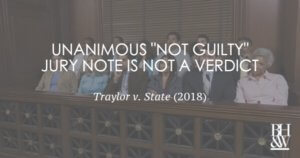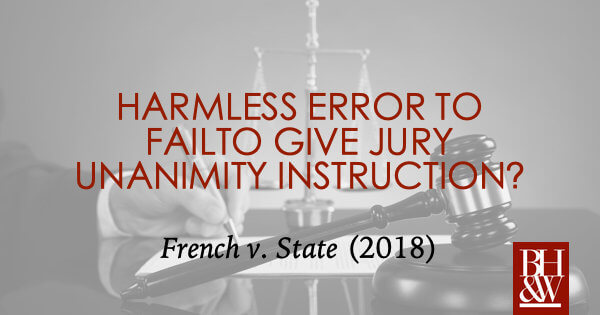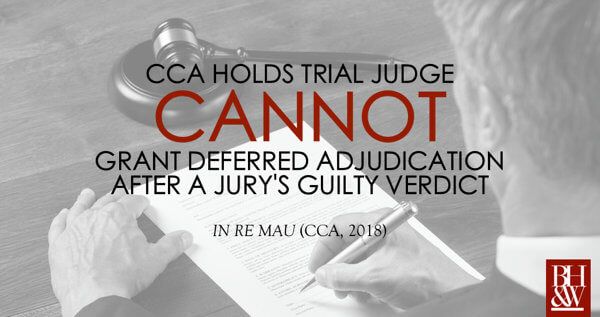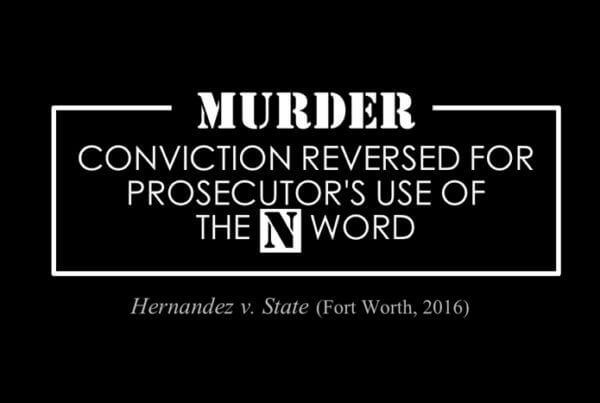 The Court of Criminal Appeals recently handed down an opinion regarding whether a jury can informally acquit based on a unanimous jury note. The issue facing the court was whether a jury note, which provided the jury’s voting breakdown of the charged offense and the lesser included offense, could be considered an acquittal for double jeopardy purposes even though a mistrial was later declared because the jury could not reach a unanimous decision.
The Court of Criminal Appeals recently handed down an opinion regarding whether a jury can informally acquit based on a unanimous jury note. The issue facing the court was whether a jury note, which provided the jury’s voting breakdown of the charged offense and the lesser included offense, could be considered an acquittal for double jeopardy purposes even though a mistrial was later declared because the jury could not reach a unanimous decision.
Traylor v. State, (Court of Criminal Appeals, 2018).
The Facts—The Trial Court Declared a Mistrial After Unanimous Jury Note.
Appellant was on trial for first-degree burglary of a habitation. At the conclusion of his trial, the jury was charged with determining whether Appellant was guilty of first-degree burglary, the charged offense, or second-degree burglary, a lesser-included offense. The difference between the two offenses is that the jury did not have to find that Appellant used a deadly weapon in order to convict him of the lesser included offense.
During deliberations the jury sent out a note stating that it unanimously agreed that Appellant was not guilty of the charged offense but indicated they were deadlocked (5-7) on the issue of guilt for the lesser-included offense. The trial court instructed the jury to keep deliberating before ultimately declaring a mistrial because the jury claimed they still could not reach a unanimous verdict.
Appellant was later re-tried and convicted of first-degree burglary. Appellant appealed this verdict, arguing that the trial court abused its discretion by granting a mistrial without a manifest necessity, and therefore, creating a double jeopardy violation.
The Court of Appeals Agreed with Appellant—Holding Appellant’s Subsequent Trial for First-Degree Burglary Was Barred Because The Jury’s Note Amounted to an Acquittal.
In agreeing with Appellant, the Court of Appeals cited United States Supreme Court decision, Blueford v. Arkansas, 566 U.S. 599 (2012). The Court of Appeals held the facts in Appellant’s case to be significantly distinguishable from Blueford; thus, warranting an acquittal. The Court of Criminal Appeals, however, disagreed and reversed for the reasons discussed below.
The Court of Criminal Appeals Reversed the Court of Appeals’ Decision—Holding the Jury Note Was Not a Final Verdict of Acquittal Because it Lacked The “Finality Necessary to Constitute an Acquittal.”
Double Jeopardy protects individuals from multiple prosecutions for the same offense. However, a trial may be ended without barring a subsequent prosecution for the same offense when “particular circumstances manifest a necessity” to declare a mistrial. Such circumstances include a jury’s inability to reach a verdict. For a jury note regarding the jury’s inability to reach a verdict to bar a subsequent prosecution, there must be some indication that the jury had “finally resolved” to acquit the defendant.
In Blueford, the Supreme Court held that the jury’s report of the vote count was not finally resolved to acquit the defendant because it lacked the “finality necessary to constitute an acquittal.” The Supreme Court noted that the vote count lacked finality because: “(1) the jury was still deadlocked on the lesser-included offense; (2) the jury continued deliberating after the reported vote count; (3) the foreperson gave no further indication that the jury was still unanimous; and (4) nothing in the jury instructions prohibited the jurors from revisiting the prior vote.”
Here, the Court of Criminal Appeals held that the jury’s note also lacked the “finality necessary to constitute an acquittal” on the charged offense. The Court of Criminal appeals reasoned that the jury note lacked finality because the jury continued deliberating after the unanimous vote count and there was no indication that the vote on the charged offense remained unanimous throughout deliberations. Furthermore, the jury never filled out the Court’s verdict forms because, as reported by the jury, they still had “no decision.” Thus, while there are circumstances in which a jury can informally acquit a defendant, the facts in this case do not warrant an acquittal.
TAKEAWAY: It appears that the CCA might have come down differently if the jury had returned a 2nd note stating that they were still unanimous that the defendant was not guilty of the greater offense after all deliberations, or if the jury had signed the verdict form indicating such, even if there was ultimately no verdict. If you are faced with a similar circumstance, before the judge declares a mistrial, try to find a way to pin the jury down so that you can use it later if the state decides to try the case a second time.










